- Home
- Will Hobbs
City of Gold
City of Gold Read online
Map
Dedication
to my brother Ed,
who kept asking after my mules
and to my nephew Matt,
remembering the best of times
in the wild San Juans
Contents
Cover
Map
Title Page
Dedication
1. It’s Your Misfortune
2. Tell Us Where We Stand
3. Muster a Posse!
4. Moneybags
5. Leaving in the Morning
6. Tracking the Skunk
7. Too Late to Turn Back Now
8. City of Gold
9. Sold to the Tomboy
10. Is That Justice?
11. So Many Graves
12. The Notorious Smuggler-Union
13. The Gentle Giant
14. Fire on the Mountain
15. That Old Yarn
16. Blue Lake
17. Not Much for Paperwork
18. Cries of Pride and Grief
19. The Fort Worth Five
20. On the Trail of Kid Curry
21. The Four Hundred Horsemen
22. On the Banks of the Colorado
23. The Moment of Decision
24. That’s Really Low
25. Where Will You Go?
26. Spellbound
27. Homeward Bound
28. Fine as a Frog Hair
29. Wise as Solomon
30. Before We Pass on
Author’s Note
About the Author
Books by Will Hobbs
Copyright
About the Publisher
1
It’s Your Misfortune
OUR MULES WERE whickering in the dead of night. Hercules and Peaches were in distress and trying to get my attention. Something was wrong but I wasn’t able to do a thing about it. For some reason I couldn’t even move. Their whinnies turned to squeals of terror. “Wake up, Owen,” my father was saying. Pa was at my bedside, shaking my shoulder. “The barn’s on fire.”
Now that I’d scared myself awake, I found myself not in my bed back in Kansas, but on the kitchen floor of a two-room house in southwest Colorado. Moonlight was pouring through the kitchen windows. It took me a couple seconds to get my bearings. Pa was eight months dead. We were on our own now, my mother and kid brother and me. Ma was asleep in her room. Till was on the couch at the other end of our kitchen and sitting room, having a bad dream of his own. He was thrashing in his blanket like a wildcat caught in a grain sack.
Here came the whickering again, louder than would have been possible behind closed barn doors. Somehow our mules were out of their stalls and out of the barn. I peeled back my blanket, rose from my straw tick, and got dressed as quickly and quietly as possible.
I glanced toward Ma’s door and back to Till. They hadn’t roused. Best to look into this without waking them. Ma called me “the man of the house” though the expression was three sizes too big for me—I was a boy of fifteen. It meant she was counting on me. I reached for my mackinaw coat and felt hat on the pegs by the door and let myself outside.
All was quiet except the burbling of Hermosa Creek and the breeze in the pines. I looked toward the barn, lit bright by the moon, and saw the doors standing wide open. At least the barn wasn’t on fire.
As I buttoned my coat against late September’s keen night air, I heard a bit of clatter and looked in the other direction, toward the train tracks that ran from Durango to Silverton. I was stunned by what I saw, a rider in the moonlight heading out of our driveway and across the railroad tracks. He was turning north onto the wagon road.
The rider was trailing a packed horse and two unloaded mules, the first as big a mule as you’ll ever see, the second with spotted hindquarters. Hercules and Peaches without a doubt.
I was about to shout at the thief but stifled the impulse. Do something and fast, I told myself, and ran toward the barn.
At my pounding footsteps, our saddle horse whinnied nervously from her stall. “Queenie!” I called, and she nickered back. I had to calm her and feed her a handful of grain before she would take the bit. Once bridled, Queenie let me lead her into the moonlight and saddle her with no further objections.
I tried to get a fix on the time of night. That shiny full moon had most of its arc yet to travel. It was still in the east, above the ridge across the Animas River. Midnight, maybe? Come daylight the scoundrel would be long gone.
Follow him, and then what? I didn’t have a thread of a plan. I only knew we’d be sunk without those mules.
I might be making a big mistake, but I had to take the risk. I fetched the lumber pencil I kept on the windowsill, grabbed a mill scrap, and wrote in capital letters:
THIEF STOLE OUR MULES—MIDNIGHT—
I’M HEADED NORTH ON QUEENIE
By the time I rode out of our place and took to the wagon road, the crook was out of sight. As I passed by the settlement of Hermosa there was nobody around, no lamp burning in the general store.
Crossing the bridge over Hermosa Creek, I was about to urge Queenie into a trot but held off as the Hermosa Creek Trail came to mind. In early August, a few weeks after our first day at the new place, I rode a couple miles up the creek trail. How far it went into the mountains I had no idea. Any chance the rider had taken the trail instead of sticking to the wagon road?
Silverton, if that’s where he was heading, was forty miles up the road. On the road he’d be spotted for sure, any number of times. Wouldn’t he try to get off it as soon as he could?
I went with my hunch and started up the trail. Before long I came to a stretch of soft dirt and puddled rainwater where I found what I was looking for—fresh tracks of mules as well as horses. A mule has a smaller hoof, and ours were unshod, as were these. Now was the time to pick up the pace, but under the trees the moonlight was scarce and the trail rocky. I had to bide my time.
My mind went to the why and wherefore behind the stealing. From our place we’d seen mule teams pulling freight up the road to Silverton, and unharnessed mules being driven that direction. They were indispensable to the mining towns and especially the mines, far better suited to the work than horses or burros and therefore of greater value. The gutter rat I was tracking had no doubt studied the excellence of our mules from the road, then waited on the full moon to do his dirty work. Remembering the squealing scream of terror I’d heard through my sleep, I wondered if he struck one of our mules. If so, I was hoping he was rewarded with a swift kick.
A couple hours up the trail, well past where I’d been before, I left the pines and entered a long meadow bathed in moonlight. The high peaks above the forest came into view, already showing snow in the last week of September. The meadow was sprinkled with cattle, some up and grazing in the moonlight. Rounding a bend in the creek, I made out a fire in front of the trees at the far end of the meadow. Who would have a blazing campfire going in the middle of the night?
Someone who’d recently arrived.
What was my next move?
Presume upon the better angels of his nature, I decided. If he had any.
As I neared the trees I saw one man and two horses. The man was sitting on a log close to the fire. His horses were tethered to nearby branches, not hobbled and not in the corral between him and the creek.
I couldn’t make out his features as yet. His floppy hat was pulled low, but he was aware of my approach. How could he not be, as conspicuous as I was in bright moonlight on open ground? His black beard was cropped short.
I spotted a rifle in its scabbard on the riding horse. The canvas pannier bags off his packhorse were propped close at hand against the log.
“Evening,” I said as I drew closer yet.
“Not hardly,” he gru
nted.
I swung out of the saddle and walked a little closer, Queenie’s reins in hand.
“Hold it right there,” he barked. He appeared to have a wad of tobacco in the side of his mouth.
In the moment I noticed his gun belt I tried not to show my alarm. He had a big revolver on his hip, maybe a Colt .45.
A slab of meat in his frying pan was at hand, but he wouldn’t have cooking coals anytime soon. Why such a hot fire? The night was cold, but not that cold. “Any luck hunting?” I asked. “Get an elk?”
“Just before dark, but what business is it of yours? Inviting yourself to supper?”
“I’ve never seen an elk. I’m new in the country.”
“Not interested in your life story and not looking for company.”
The man’s cruel face and utter lack of civility were chilling, but I pressed on. “We’re farmers. We left good ground behind in eastern Kansas, pulled up stakes in favor of southwest Colorado after my father died of consumption.”
“‘It’s your misfortune and none of my own.”
“Both of my grandmothers died of it, too. Ma calls it the family curse. We’re trying to make a new start where the air is dry and we won’t catch it.”
“State your business, kid.”
He had some kind of metal rod propped on a rock. Its low end was in the fire.
“I won’t keep you from your supper. The thing is, we’re hanging on by the skin of our teeth. It cost us plenty to move our farm tools and animals out here, and the only way we can keep from going under is if we can sell crops next summer.”
“So?”
“Our ground’s never been plowed and our mules are missing.”
He laughed. “So that’s what this is about. You’re wondering if I’ve seen your mules.”
“I tracked them up this trail. Have you seen ’em?”
Here was his chance. It would be so easy for him to say something like As a matter of fact I happened upon two stray mules. Got ’em tied up back in the trees.
“Ain’t seen ’em,” he said. “What do they look like?”
“One’s a great big gelding, dark brown, with white around his eyes and a white muzzle. The other’s a gray female, has Appaloosa spots on her rump.”
“I’ll keep an eye out.”
“Please, mister, my mother and little brother and me aren’t going to make it without those mules.”
“I already told you I’d keep an eye out. Unless you’re insinuatin’ I stole ’em. Is that what you just did?”
There was a chance this man was plumb innocent. He could be an elk hunter.
I had to take a chance. “Hercules!” I called, real loud.
Hercules knew it was me, and whinnied back.
“Peaches!” I cried, and she whinnied in return.
The rustler rose to his feet. He was of medium height, lean and wiry. The effort to rise had caused him to wince. Perhaps he’d been kicked by a mule.
“They’re back in the timber,” I said. “I’ll just collect them and go.”
“You sayin’ I took ’em?”
“No sir, by no means. How were you to know they were there? Whoever took them is long gone.”
He spat a stream of tobacco juice into the fire, and then he drew his pistol. “Get along, little dogie, or I’ll leave your gut-shot carcass for the coyotes.”
The way he said that last part, raising his voice as he leveled his gun at my heart, left little doubt. I saw it in his eyes. This was more than a threat. He was on the verge of pulling the trigger.
I had to say something, but what? “Sorry,” I said. “No offense intended.” I turned away quickly, hoping against hope he wouldn’t shoot me in the back.
I mounted up, wondering if I was drawing my last breath. I rode off slowly, trying not to show my fear, wondering all the while if he was reaching for his rifle. Those next couple minutes on that moonlit meadow took an eternity.
2
Tell Us Where We Stand
THE SUN WAS rising over the rim of our narrow river valley as I rode into Hermosa. I got a friendly wave from the old man sweeping the porch of his general store. No doubt Joe Buckland was wondering where I’d been, to be riding out of the mountains so early in the morning. What an encouraging welcome he’d given us that first day we stepped off the train. “To my mind, you’ve got the best forty acres of farming ground in the Animas Valley.”
Maybe the storekeeper had seen the thief snooping around. Something he knew might help me get our mules back. I should talk with him, but Ma and Till came first. I was mulling over how they were going to react. Till would be thrilled out of his trousers at hearing that an outlaw drew a gun on me. It was a scene out of his page-worn “Blood and Thunders.” As it was, Till was finding southwest Colorado in the first year of the new century disappointingly civilized, not the Wild West he’d been expecting. To hear him tell it, he was “disillusionated.”
As to how Ma would take to hearing the way my mule chase ended—me looking into the barrel of a gun—I had no doubt. Our family had Quaker roots dating to William Penn’s colony and all the way back to England, and Ma abhorred violence with a passion. If she thought there was any likelihood of me dying by the gun like my grandfathers, I wouldn’t get a second chance at recovering our animals. Arriving home, I’d better measure my words.
At the sight of our new farm, bordered on three sides by the narrow-gauge railroad, Hermosa Creek, and the Animas River, I felt a sharp pang at how much we stood to lose. From the beginning, I was smitten with our new ground on the lap of the San Juans, one of the highest and most rugged ranges in the Rocky Mountains. “No finer country,” Uncle Jacob had written, and I felt the same way.
Till had been keeping a lookout. Little brother raised a dust cloud as he ran down the drive. For a nine-year-old he had an extremely heavy foot. I got off Queenie and closed the gate behind me.
“You didn’t find our mules!” Till cried, all out of breath.
“On the contrary,” I said, reminding myself to watch my step.
“You caught up with the varmint what took ’em?” Till had a literary bent, and his lingo borrowed heavily from dime novels and Huck Finn.
“I tried to play on his heartstrings,” I replied, “but he didn’t have any.”
“Why didn’t you just take Hercules and Peaches and go?”
“He had a gun on his hip and threatened to use it.”
“He drew on you?”
“It didn’t come to that.”
Till’s disappointment showed, but he was happy enough at discovering that Colorado still had gun-toting outlaws.
Ma was waiting for us on the house porch, her face lit with relief and questions. “Owen, while you see to Queenie, I’ll whip up a quick breakfast. Then tell us where we stand.”
Till was sour on waiting, but Ma was the one person he never kicked.
Over breakfast I told what happened, starting with my dream. Ma was dead sick at the telling even though she could plainly see I was in one piece. Till was so rapt he never once broke in.
“Owen,” said Ma when I was done, “you were brave to do what you did. Maybe too brave. Your father spoke to you in your dream. Has that happened before?”
“Plenty of times.”
“Same here. How about you, Till?”
Till wouldn’t meet her eye. He nodded while staring at a pine knot on the floor. Till was five when Pa first coughed up blood. Pa’s years of suffering took an especially heavy toll on him, young as he was.
“Your pa is still with us, boys. Starting over was never going to be easy. It looks bad right now, but if we stick together and take it one day at a time, everything will turn out okay. We’ll get those mules back, I know we will.”
Till wasn’t so sure. “How? What are we gonna do about it?”
“We’ll go find the marshal in Durango.”
Midmorning we boarded the train for the eleven-mile trip into Durango. Southbound from Silverton, its steam locomotive was pulli
ng two passenger coaches, a baggage and mail car, and four open cars full of sacked ore concentrates bound for the smelter across the river from Durango’s depot.
The passengers were nearly all men, miners from Silverton dressed in their go-to-town clothes. A dozen or so got off two miles down the line, at Trimble Hot Springs. It had a fancy hotel and restaurant, but mainly people went there to soak in the mineral pools.
After a brief stop in Animas City, with Till champing at the bit, we pulled into Durango.
Durango sprang to life in 1881, when the Denver and Rio Grande narrow-gauge railroad reached the Animas River in the distant southwest corner of Colorado. Fifty miles downstream of the mining mecca of Silverton, Durango’s location was ideal, with abundant farm and ranchland nearby and high-quality coal to be mined barely out of town. By ’82 the railroad reached Silverton, its original goal, nestled in the high San Juans.
I loved Durango except for the coal smoke that often got Ma coughing. The smelter, the trains, and the power plant that produced electricity all burned coal, not to mention the cookstoves and heating stoves of Durango’s residents, upward of three thousand. The ridges and mesas flanking the town kept the smoke from escaping when the wind wasn’t strong enough to chase it out.
As we got off at the depot I was brooding about our chances of staying afloat. Ma had a bank account in Durango, but would never let me in on how much we had in it. On the same day she started the bank account, she met with the lawyer who’d sent us Uncle Jacob’s will. If she learned anything new from the lawyer, she wasn’t telling.
Not that I would fault her. All three of us were keen to escape the pall of tuberculosis, and her boys had been sold on Colorado ever since Uncle Jacob’s first letter singing its praises. Our timing, though, was awful. The spring of 1900 was a terrible time to have sold our farm, no matter how productive it had always been, with fertile ground and plentiful rainfall. Most of the country was climbing out of the depression, but eastern Kansas was still suffering from the Panic of ’93. Farmers like us were getting so little for the contents of our overflowing corncribs, we were burning corn for fuel instead of buying coal. How bad a shellacking we’d taken when Ma sold the farm, I could only guess.

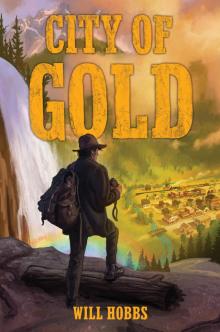 City of Gold
City of Gold Kokopelli's Flute
Kokopelli's Flute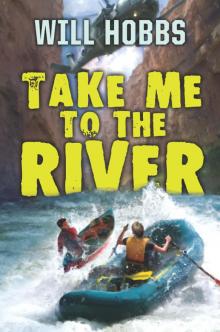 Take Me to the River
Take Me to the River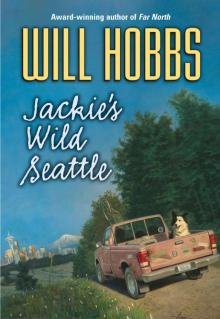 Jackie's Wild Seattle
Jackie's Wild Seattle The Maze
The Maze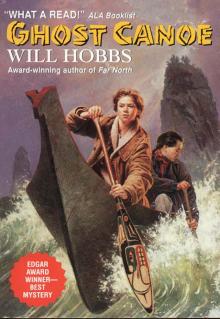 Ghost Canoe
Ghost Canoe Never Say Die
Never Say Die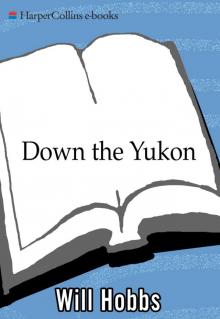 Down the Yukon
Down the Yukon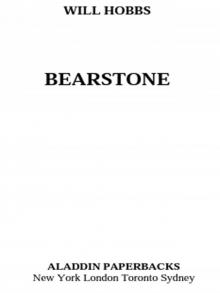 Bearstone
Bearstone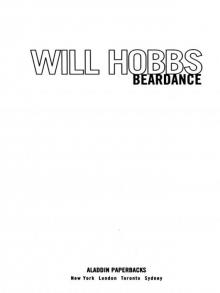 Beardance
Beardance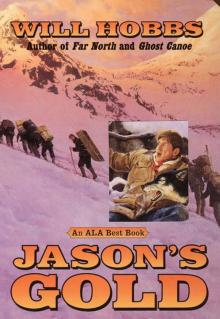 Jason's Gold
Jason's Gold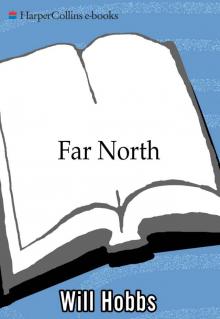 Far North
Far North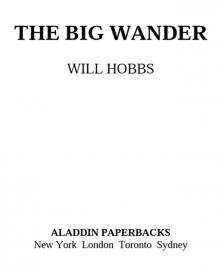 The Big Wander
The Big Wander River Thunder
River Thunder Downriver
Downriver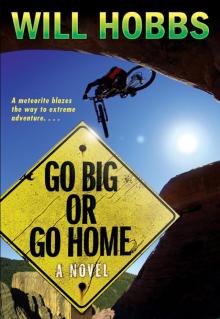 Go Big or Go Home
Go Big or Go Home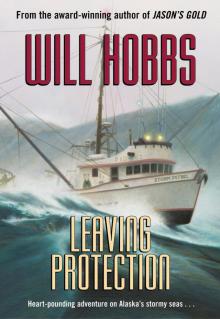 Leaving Protection
Leaving Protection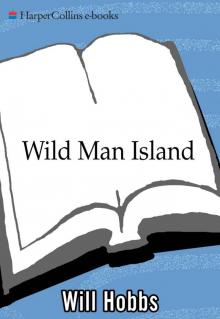 Wild Man Island
Wild Man Island